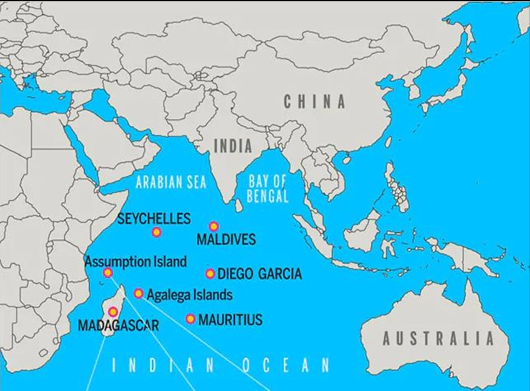Important Facts For Prelims
Colombo Security Conclave Charter
- 11 Oct 2024
- 4 min read
Why in News?
Recently, the members of Colombo Security Conclave (CSC) India, Sri Lanka, the Maldives and Mauritius signed a Charter and a memorandum of understanding, for the establishment of the CSC secretariat in Colombo.
- Bangladesh was absent and Seychelles participated as an observer state.
What are the Key Facts About the Colombo Security Conclave?
- Background of CSC: It was originally known as the NSA Trilateral on Maritime Security and was established between India, Sri Lanka, and the Maldives in 2011.
- It was an initiative of Sri Lanka to enhance maritime security in the Indian Ocean Region.
- Members: India, Sri Lanka, and the Maldives were its founding members.
- Mauritius joined the conclave in 2022 while Bangladesh joined in 2024. Seychelles is an observer state.
- Goals of CSC: Cooperation under the CSC focuses on five goals:
- Maritime safety and security.
- Countering terrorism and radicalisation.
- Combating trafficking and transnational organised crime.
- Cyber security and protection of critical infrastructure and technology.
- Humanitarian assistance and disaster relief.
- Defence Exercises: In November 2021, India, Sri Lanka, and Maldives conducted Exercise Dosti XV in Maldives.
- India, Sri Lanka, and Maldives subsequently conducted their first joint exercise in the Arabian Sea under the aegis of the CSC.
- Dialogues and Meetings: The first dialogue among the three countries took place in 2011 in the Maldives, followed by meetings in Sri Lanka (2013) and India (2014).
- The dialogue stalled after 2014 due to rising India-Maldives tensions and China's growing influence in the Indian Ocean.
- It was revived and re-branded as the Colombo Security Conclave in 2020.
- Significance of CSC: The CSC strengthens India's Indian Ocean outreach, counters China's influence, enhances maritime security, aligns with the SAGAR vision, and fosters sub-regionalism among six Indian Ocean nations on a shared security platform.
Why is the Indian Ocean Important for India?
- Central Location: The Indian Ocean, stretching from Africa to Australia, positions India to control key maritime routes, including critical choke points like the Straits of Malacca and Hormuz, vital for global trade and national interests.
- Trade Routes: India has historically acted as a resident power in the Indian Ocean, occupying 40% of strategic waters
- Approximately 95% of India's trade by volume and 68% by value passes through the Indian Ocean.
- Energy Security: India relies heavily on the Indian Ocean for its energy needs, with nearly 80% of crude oil requirements imported via this route.
- Rich in Minerals: The Indian Ocean accounts for 40% of the world's offshore oil production and reservoir for minerals such as nickel, cobalt, and copper.
- Fishing Industry: The Indian Ocean has significant fishing grounds and India's fishing industry employs approximately 14 million people.





